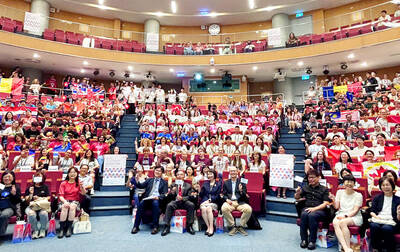The US dollar weathered fresh losses on Friday, despite a stronger-than-expected snapshot on consumer spending, amid expectations that eurozone interest rates will be hiked next week.
The gap in US and eurozone rates — US rates are considerably lower — has already weighed on the dollar which has also been weakened by lackluster economic growth in the US.
The euro was changing hands at US$1.5790 around 9pm GMT, up from US$1.5756 late on Thursday. The US currency also fell against the yen, to ¥106.11 from ¥106.73 on Thursday.
The euro gained on Friday as many analysts expect the European Central Bank (ECB) will raise its benchmark interest rate by a quarter of a point to 4.25 percent next week to avert a spurt in inflation, largely triggered by rocketing world oil prices. A tightening action by the ECB would make the euro even more attractive to investors.
In late New York trading, the dollar was priced at 1.0185 Swiss francs, down from SF1.0236 late on Thursday.
The British pound was quoted at US$1.9948, up from US$1.9883 a day earlier.

TAIWAN IS TAIWAN: US Representative Tom Tiffany said the amendment was not controversial, as ‘Taiwan is not — nor has it ever been — part of Communist China’ The US House of Representatives on Friday passed an amendment banning the US Department of Defense from creating, buying or displaying any map that shows Taiwan as part of the People’s Republic of China (PRC). The “Honest Maps” amendment was approved in a voice vote on Friday as part of the Department of Defense Appropriations Act for the 2026 fiscal year. The amendment prohibits using any funds from the act to create, buy or display maps that show Taiwan, Kinmen, Matsu, Penghu, Wuciou (烏坵), Green Island (綠島) or Orchid Island (Lanyu, 蘭嶼) as part of the PRC. The act includes US$831.5 billion in

‘WORLD WAR III’: Republican Representative Marjorie Taylor Greene said the aid would inflame tensions, but her amendment was rejected 421 votes against six The US House of Representatives on Friday passed the Department of Defense Appropriations Act for fiscal 2026, which includes US$500 million for Taiwan. The bill, which totals US$831.5 billion in discretionary spending, passed in a 221-209 vote. According to the bill, the funds for Taiwan would be administered by the US Defense Security Cooperation Agency and would remain available through Sept. 30, 2027, for the Taiwan Security Cooperation Initiative. The legislation authorizes the US Secretary of Defense, with the agreement of the US Secretary of State, to use the funds to assist Taiwan in procuring defense articles and services, and military training. Republican Representative

Taiwan is hosting the International Linguistics Olympiad (IOL) for the first time, welcoming more than 400 young linguists from 43 nations to National Taiwan University (NTU). Deputy Minister of Education Chu Chun-chang (朱俊彰) said at the opening ceremony yesterday that language passes down knowledge and culture, and influences the way humankind thinks and understands the world. Taiwan is a multicultural and multilingual nation, with Mandarin Chinese, Taiwanese, Hakka, 16 indigenous languages and Taiwan Sign Language all used, Chu said. In addition, Taiwan promotes multilingual education, emphasizes the cultural significance of languages and supports the international mother language movement, he said. Taiwan has long participated

The paramount chief of a volcanic island in Vanuatu yesterday said that he was “very impressed” by a UN court’s declaration that countries must tackle climate change. Vanuatu spearheaded the legal case at the International Court of Justice in The Hague, Netherlands, which on Wednesday ruled that countries have a duty to protect against the threat of a warming planet. “I’m very impressed,” George Bumseng, the top chief of the Pacific archipelago’s island of Ambrym, told reporters in the capital, Port Vila. “We have been waiting for this decision for a long time because we have been victims of this climate change for